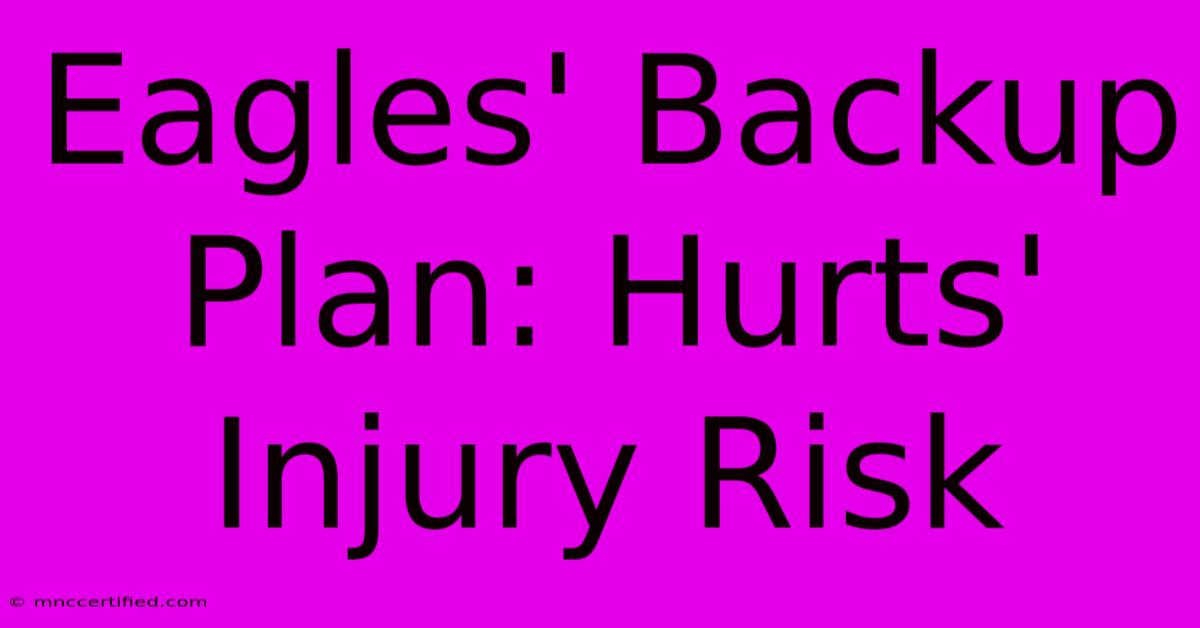Eagles' Backup Plan: Hurts' Injury Risk

Table of Contents
Eagles' Backup Plan: Hurts' Injury Risk - A Necessary Concern
The Philadelphia Eagles' success hinges heavily on the performance of quarterback Jalen Hurts. His dynamic playmaking ability is undeniable, but his injury history raises a critical question: what's the Eagles' backup plan if Hurts goes down? This isn't just a hypothetical; it's a legitimate concern impacting the team's playoff aspirations and overall success. This article delves deep into the Eagles' backup quarterback situation, exploring the risks associated with Hurts' playing style and analyzing the capabilities of his understudies.
The Jalen Hurts Factor: High Reward, High Risk
Hurts' electrifying play style – a potent blend of passing and rushing – is a major asset for the Eagles. He consistently extends plays, keeps drives alive, and creates scoring opportunities seemingly out of nothing. However, this aggressive approach carries a significant injury risk. His willingness to absorb hits and run the ball, while often spectacular, exposes him to potential concussions, sprains, and other debilitating injuries. The sheer volume of contact he endures over a season makes him a statistically higher risk for injury compared to more pocket-passing quarterbacks.
Analyzing the Injury Risk: A Statistical Perspective
While precise injury prediction is impossible, analyzing past data reveals a trend. Hurts' history, though relatively short, includes instances where he's played through pain and taken significant hits. This raises concerns about the long-term consequences and the potential for recurring injuries, highlighting the need for a robust backup plan. Expert analysis of NFL injury data shows quarterbacks with a similar playing style often face a higher incidence of upper and lower body injuries.
Examining the Eagles' Backup Options: Strengths and Weaknesses
The Eagles' backup quarterback situation is a crucial element in mitigating the risk associated with Hurts' injury. Let's analyze the strengths and weaknesses of the current depth chart:
[Backup Quarterback Name 1]: A Closer Look
[Provide a detailed analysis of the backup quarterback. Include stats, strengths, weaknesses, experience, and potential performance level if thrust into a starting role. Be objective and factual. For example: "While [Backup Quarterback Name 1] lacks the same dynamic playmaking ability as Hurts, he boasts a strong arm and proven accuracy on short and intermediate routes. His experience in the league is limited, potentially impacting his performance under pressure." ]
[Backup Quarterback Name 2]: The Potential Wildcard
[Repeat the above analysis for the second-string quarterback or any other potential backup. For example: "[Backup Quarterback Name 2] is a less experienced option, primarily known for his accuracy and pocket presence. However, his limited experience in game-day pressure situations could pose a challenge if he were to be unexpectedly thrust into a starting role." ]
Mitigating the Risk: Beyond the Backup Quarterback
A comprehensive backup plan doesn't solely rely on the capabilities of the backup quarterbacks. Other factors contribute to the Eagles' ability to manage the risk:
-
Offensive Line Performance: A strong offensive line is crucial in protecting Hurts and providing time for the backup quarterback to make reads and deliver passes. Their performance directly impacts injury risk.
-
Offensive Scheme Adjustments: The coaching staff's ability to adapt the offensive scheme to suit the backup quarterback's strengths is crucial. Simplifying the playbook might be necessary to avoid overloading the backup.
-
Team Depth: A strong supporting cast, including a robust running game and a reliable defense, can help offset any offensive deficiencies caused by a change in quarterback.
Conclusion: The Necessity of a Robust Backup Plan
The Philadelphia Eagles' success rests heavily on Jalen Hurts' shoulders. However, the inherent risks associated with his playing style necessitate a well-defined and robust backup plan. While no backup can perfectly replicate Hurts' dynamic abilities, the Eagles must ensure their backup quarterbacks are adequately prepared, and the team is strategically positioned to manage the risk of an injury to their star quarterback. The team's performance throughout the season will heavily depend on successfully navigating this critical challenge.

Thank you for visiting our website wich cover about Eagles' Backup Plan: Hurts' Injury Risk. We hope the information provided has been useful to you. Feel free to contact us if you have any questions or need further assistance. See you next time and dont miss to bookmark.
Featured Posts
-
Trumps Canal Claim Impact On Us Relations
Dec 23, 2024
-
Real Madrid Vs Sevilla Starting Xi
Dec 23, 2024
-
Jaguars Vs Raiders Live Game Updates Week 16
Dec 23, 2024
-
Commanders Eliminate 2024 Nfl Playoff Picture
Dec 23, 2024
-
Paradise Evolves Beyond White Savior
Dec 23, 2024